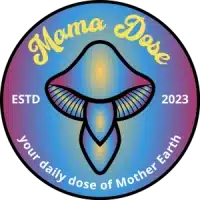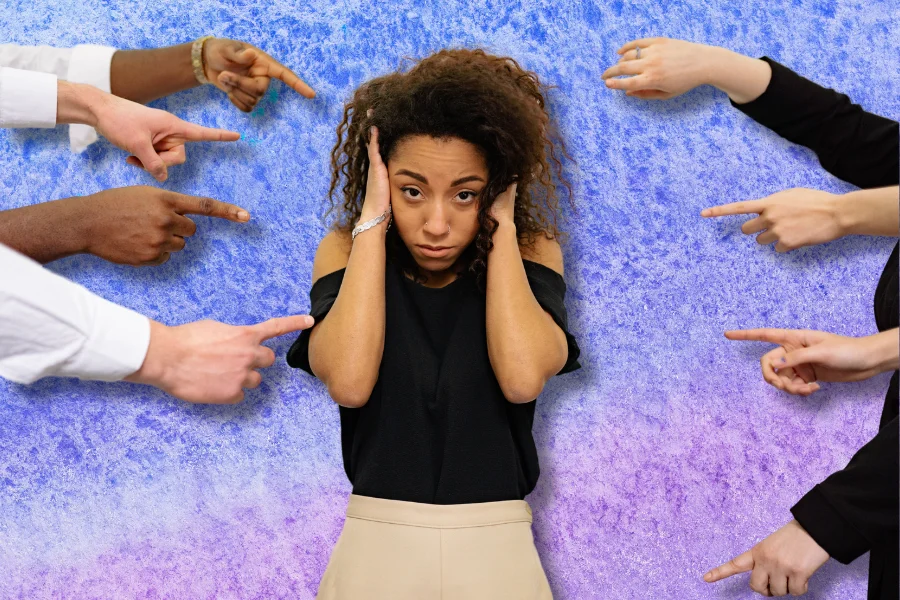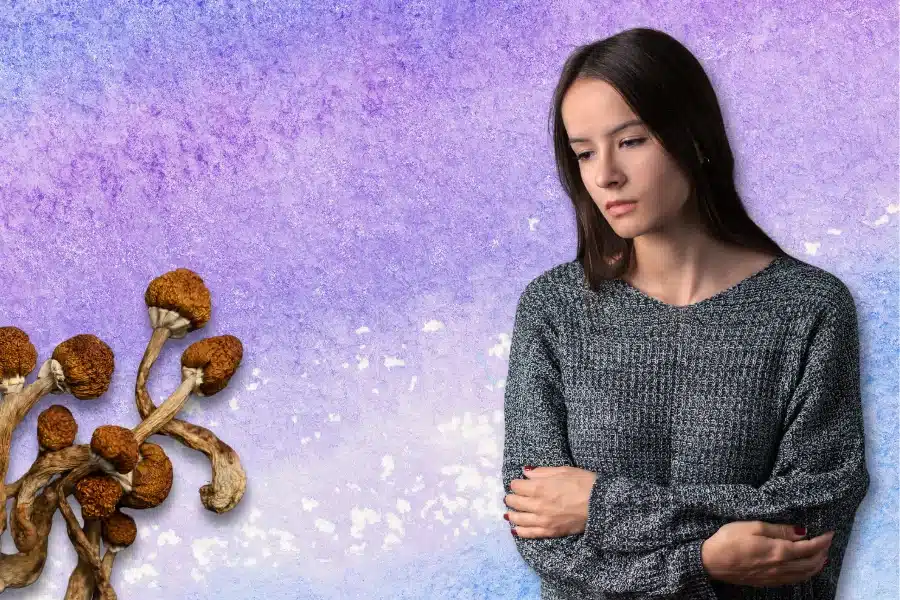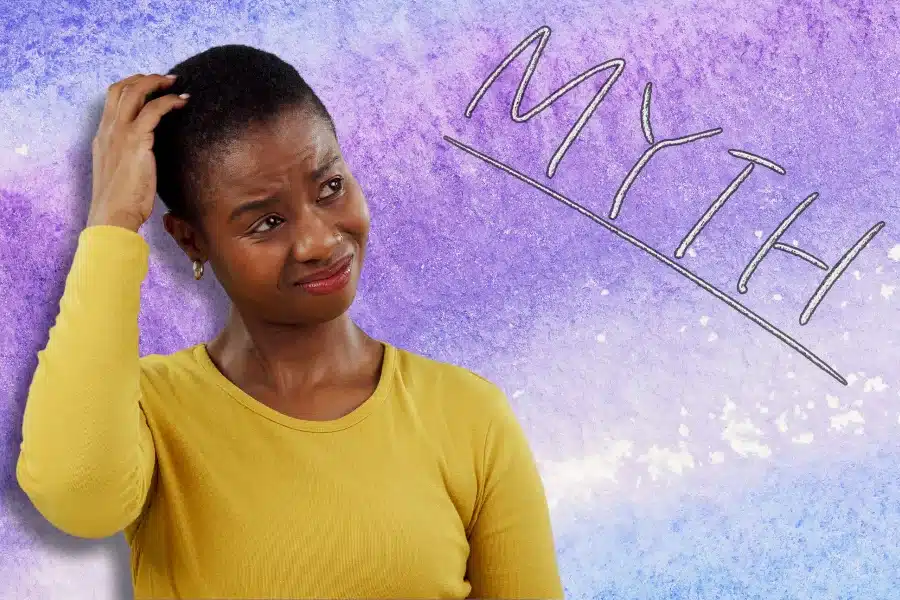

Table of Contents
Toggle
Psilocybin, the key compound in magic mushrooms, has sparked interest in managing anxiety. Many people are exploring its potential in psychedelic-assisted therapy. It’s vital to discern reality from myth in this evolving field. What if our assumptions about psilocybin products and anxiety are not accurate? Some people report increased anxiety, especially with higher doses, and when the effects are slowly starting to kick in. With so many mixed reports and varying individual experiences, it becomes clear that psilocybin and anxiety are topics of great debate.
Psilocybin is the active compound in some mushrooms with a history spanning centuries. Known as “magic mushrooms,” they have been integral to spiritual and medicinal practices all over the world. Today, psilocybin is receiving more scientific interest for its possible benefits in treating mental health issues and anxiety. However, to better understand how exactly psilocybin may help with anxiety we need to look into how it works in the body.
Simply put, psilocybin resembles serotonin, a key neurotransmitter in the brain. When taken, it changes into psilocin. This compound affects the brain notably through the 5-HT2A receptors. Such engagements are thought to cause the psychedelic experiences usually linked with psilocybin. From the scientific lenses of neuroscience and pharmacology, psilocybin shifts brain activity. It is found to increase connections between brain areas. This change leads to a more adaptive and potential new neural network, suggesting possible therapeutic roles.
The connection between psilocybin and anxiety has drawn significant research attention. Studies and trials investigate the therapeutic potential of this psychedelic compound for anxiety disorders. In a standout study, the Journal of Psychopharmacology detailed psilocybin’s impact on those with hard-to-treat depression and anxiety. The findings were intriguing. A single psilocybin dose, supported by psychological therapy, led many patients to lasting reductions in anxiety and depression symptoms.

Researchers studying the neuroscience and psychology of psilocybin are discovering ways in which psilocybin may reduce anxiety. They suggest that psilocybin works by influencing the brain’s serotonin 2A receptors. These receptors are key in mood, perception, and emotional regulation. The changes at this level likely contribute to psilocybin’s ability to ease anxiety and support emotional recovery. Additionally, studies point to the importance of mystical experiences associated with psilocybin. These profound events seem connected to its anxiety-reducing effects. They can offer new insights, enhance self-understanding, and foster a sense of unity. Such effects are believed to aid in anxiety relief. However, there is another side of the story, in some cases, psilocybin may potentially increase anxiety, especially in higher doses, known as “pre-trip anxiety”. Although it is temporary it can still be unpleasant, and change the way of the overall psychedelic journey.
Using psilocybin to manage anxiety raises concerns about pre-trip anxiety. Many newcomers to the psilocybin journey face this. Yet, with the right prep and mindset, this anxiety can be managed.
Thorough preparation is key to handling pre-trip anxiety. This includes learning about psilocybin and setting up a secure environment for your journey. A peaceful space, without disturbances, helps reduce anxiety, and also does having a trusted tripsitter. It lets the person concentrate on their internal exploration. It’s also important to have a positive and open mindset. Practicing meditation, deep breathing, or yoga can induce a calm state and prepare the person for a deep, meaningful experience.
Despite extensive research, myths about psilocybin’s addiction risk continue to circulate. Many people mistakenly believe that psilocybin can lead to dependence. However, studies consistently show that its potential for addiction is very low, especially when used in controlled therapeutic settings.

There are also concerns that psilocybin therapy might worsen anxiety or trigger psychosis. While some individuals may experience brief discomfort during therapy, this discomfort is often a necessary part of the therapeutic process. Trained professionals are equipped to manage these effects, ensuring a low risk of adverse events. Under proper supervision, psilocybin therapy can offer significant long-term relief from anxiety.
Additionally, some people mistakenly view psilocybin solely as a recreational drug with no medical value. Contrary to this belief, a growing body of scientific evidence supports its effectiveness in treating conditions like anxiety, depression, and addiction. To fully appreciate psilocybin’s medical potential, it is essential to rely on well-researched, evidence-based psilocybin information.
Research is shedding light on psilocybin as a potential help for those with anxiety issues. Studies are particularly interested in how psilocybin lessens anxiety symptoms. They’ve shown that treatments including psilocybin can lower the intensity and regularity of anxious thoughts and feelings. By affecting the brain’s serotonin system, psilocybin might help bring emotional balance and a new perspective, making it easier to deal with anxiety.

Yet, psilocybin might do more than just cut down anxiety symptoms. Evidence suggests it could enhance life quality for those with anxiety too. Its use in therapy is believed to spark self-insight, reflection, and a stronger self-connection. This might aid in developing healthier coping methods and boost overall well-being. The mental health treatment scene is constantly advancing, with psilocybin therapy being a prime contender. Despite needing more research, there’s growing belief in the potential of psilocybin therapy. It could be a new and effective path for easing the heavy burden of anxiety.
Psilocybin’s potential to revolutionize mental health care is both exciting and profound. While it may potentially lessen anxiety it can sometimes cause it, especially before a higher dose also known as pre-trip anxiety. The promising research on psilocybin’s benefits for anxiety, depression, and other mental health conditions cannot be ignored.
Yet, we must also acknowledge the nuances and potential risks involved. Therefore, if you are thinking about trying psilocybin to help your anxiety it’s important to do it under professional guidance. In the end, psilocybin offers a unique opportunity to explore new frontiers in mental health treatment, but only if we tread carefully, informed by evidence, and driven by compassion.
Learn more about psilocybin in our blog!
Invite your friends and earn a discount on your next purchase. Your friend also earns a discount! Get started now, by sharing your referral link with your friends.
This item is currently out of stock!
By adding it to your cart, you confirm a backorder purchase, and we will ship it as soon as it becomes available.